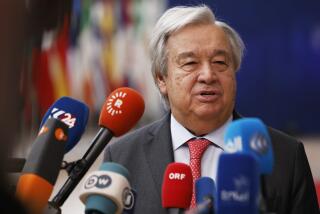EC Offers Help to Palestinians, Former East Bloc : Diplomacy: Leaders pledge support for monitoring West Bank elections. They also promise a pan-European security conference.
- Share via
BRUSSELS — Attempting to exploit their newly won collective power in foreign affairs, leaders of the 12-nation European Community expanded their support for the Middle East peace process Saturday and launched a new initiative to help stabilize the former Communist countries of Central and Eastern Europe.
“It is right that we play a major role in these areas,” noted Belgian Prime Minister Jean-Luc Dehaene, who, as leader of the host country, chaired the meeting here.
A treaty ratified last October, committing the 12 nations to an economic and political union by the end of the century, also bound them to forge common foreign and security policies.
The foreign policy moves came at a meeting otherwise dominated by hectic maneuvering during the final hours of world trade talks in Geneva and by efforts to combat the region’s growing unemployment.
A 28-page declaration issued at the end of the two-day summit offered support for monitoring the coming Palestinian elections in the Israeli-occupied West Bank and for a “swift, meaningful and uncomplicated” transfer of aid to help build a Palestinian administration in the occupied territories.
The measures are an extension of a $550-million EC assistance program to the occupied territories approved in October.
Speaking to reporters after the summit, German Chancellor Helmut Kohl stressed that contrary to normal practice, and in order to speed the flow of aid, the funds will not be tied to specific projects.
“It is vital that things move quickly to this area,” Kohl said.
In an attempt to reach out across Europe’s former East-West divide, the leaders agreed to establish a set of round-table discussions that will bring the EC together with representatives from the Baltic states and five Central and East European nations that were once Soviet satellites to study border tensions and minority rights issues.
The initiative, prompted by the conflicts in the former Yugoslav federation and deepening concerns about other simmering ethnic and nationalist tensions in former Communist nations, was labeled “defensive diplomacy” by the EC’s commissioner for external affairs, Hans van den Broek.
“Maybe we can prevent what has happened in the past--that tensions along frontiers take us by such surprise (that they are) that much harder to resolve,” he said.
Dehaene said the move will be launched with a pan-European security conference in Paris next spring. The United States and Canada will be invited to participate, according to the declaration.
The leaders also issued the latest in a series of toughly worded declarations on the Balkans, this time threatening to tighten sanctions against Serbia if Belgrade refuses to make the territorial concessions widely seen as essential if a peace plan for Bosnia-Herzegovina proposed by EC envoy Lord Owen is to have a chance of success.
Although the EC leaders invited Bosnia’s three warring parties to a meeting here Dec. 22, the prospects for a breakthrough seemed based on faith rather than any hard realities.
More to Read
Sign up for Essential California
The most important California stories and recommendations in your inbox every morning.
You may occasionally receive promotional content from the Los Angeles Times.













